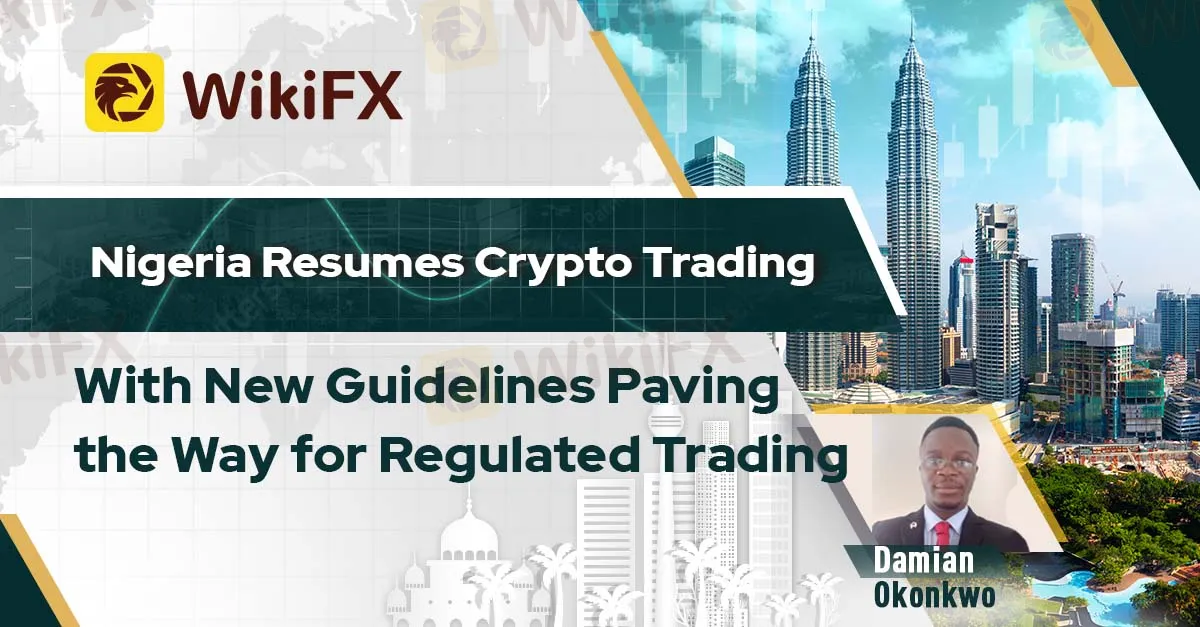简体中文
繁體中文
English
Pусский
日本語
ภาษาไทย
Tiếng Việt
Bahasa Indonesia
Español
हिन्दी
Filippiiniläinen
Français
Deutsch
Português
Türkçe
한국어
العربية
Nigeria Resumes Crypto Trading With New Guidelines Paving the Way for Regulated Trading
Abstract:After a two-year ban that sent shockwaves through the Nigerian crypto community, the Central Bank of Nigeria (CBN) has cautiously reintroduced cryptocurrency transactions with the release of comprehensive guidelines for Virtual Asset Service Providers (VASPs).

By: Damian Okonkwo

Introduction
After a two-year ban that sent shockwaves through the Nigerian crypto community, the Central Bank of Nigeria (CBN) has cautiously reintroduced cryptocurrency transactions with the release of comprehensive guidelines for Virtual Asset Service Providers (VASPs). This marks a significant shift in the country's stance towards digital assets, and its implications for the burgeoning Nigerian crypto market deserve close scrutiny.
Lifting the Ban to Embrace Regulation
The CBN's 2021 ban on cryptocurrency transactions stemmed from concerns regarding money laundering, terrorism financing, and consumer protection. However, the evolving global landscape and increasing domestic interest in crypto prompted a reevaluation. Recognizing the need for regulation rather than outright prohibition, the CBN issued the VASP guidelines, aligning with the Financial Action Task Force (FATF) recommendations and the Securities and Exchange Commission (SEC)'s digital asset regulations.
Key Features of the VASP Guidelines
● Clear Framework for Bank Accounts: VASPs can now open accounts with licensed banks, facilitating fund transfers and settlements for customers.
● Enhanced Risk Management: Banks are mandated to implement robust KYC/AML procedures for VASP clients, mitigating financial crime risks.
● Consumer Protection Focus: The guidelines emphasize transparency and disclosure requirements for VASPs, safeguarding investor interests.
● Central Bank Oversight: The CBN retains supervisory authority over VASPs and banks, ensuring compliance with the regulations.
Opportunities and Challenges
The new guidelines present several opportunities for the Nigerian crypto market. Increased legitimacy and access to banking infrastructure could fuel growth and attract foreign investment. The regulatory framework also provides a foundation for responsible innovation within the digital asset space.
However, challenges remain. The effectiveness of the VASP guidelines hinges on their diligent implementation by both VASPs and banks. Additionally, the continued prohibition of direct crypto trading by banks could limit market liquidity and hamper wider adoption.
Looking Ahead
Nigeria's cautious embrace of cryptocurrency regulation stands as a model for other African nations grappling with similar issues. The success of this approach will depend on the effective implementation of the VASP guidelines, continued dialogue between regulators and industry stakeholders, and the development of a supportive financial ecosystem for digital assets.
Conclusion
While the full impact of the CBN's policy shift remains to be seen, Nigeria's resumption of cryptocurrency transactions under a regulatory framework signifies a significant step forward. This cautious optimism acknowledges the potential of digital assets while prioritising financial stability and consumer protection. The coming months will reveal whether this measured approach paves the way for a thriving and responsible Nigerian crypto market.

Disclaimer:
The views in this article only represent the author's personal views, and do not constitute investment advice on this platform. This platform does not guarantee the accuracy, completeness and timeliness of the information in the article, and will not be liable for any loss caused by the use of or reliance on the information in the article.
Read more

Countdown to WikiEXPO Dubai 2024 — “Seeing Diversity, Trading Safely”
With the booming development of the global Fintech industry, WikiEXPO Dubai 2024, hosted by WikiGlobal and co-organized by WikiFX, will officially kick off on November 27, themed “Seeing Diversity, Trading Safely.” This event will bring together global elites to explore the future of Fintech.

Elon Musk Sparks Debate Over Presidential Power and Federal Reserve Independence
Elon Musk has voiced his support for the controversial idea that United States presidents should have a role in shaping Federal Reserve policies. This endorsement aligns with recent remarks from President-elect Donald Trump, who has hinted at revisiting the central bank's independence, a long-held tradition in the nation's financial governance.

Crypto 101: Coins vs Tokens
For those new to the world of cryptocurrency, terms like "coin" and "token" may seem interchangeable. However, understanding the distinction between these two digital assets is crucial for navigating the crypto landscape. Both coins and tokens serve as integral components of blockchain ecosystems, yet they differ in their functionalities, use cases, and the technologies underpinning them.

OANDA Expands TradingView Integration Globally
OANDA completes global TradingView integration, empowering traders in Asia and beyond with seamless access to 1700+ instruments on TradingView charts.
WikiFX Broker
Latest News
BSP Shuts Down Uno Forex Over Serious AML Violations
ACY Securities Expands Global Footprint with South Africa Acquisition
Tokyo Police Arrest 4 for Unregistered FX Trading Scheme
Rupee gains against Euro
WikiEXPO Global Expert Interview: The Future of Financial Regulation and Compliance
DFSA Warns of Fake Loan Approval Scam Using Its Logo
Consob Sounds Alarm: WhatsApp & Telegram Users Vulnerable to Investment Scams
CySEC Revokes UFX Broker Licence as Reliantco Halts Global Operations
GCash, Government to Launch GBonds for Easy Investments
Bitcoin ETF Options Get Closer to Reality with CFTC Clarification
Currency Calculator


